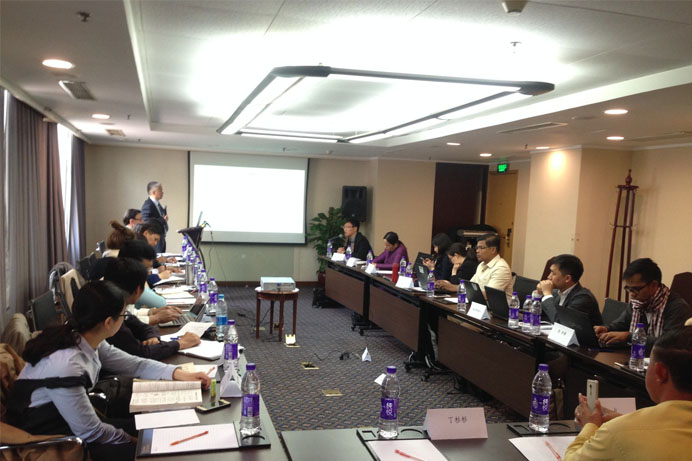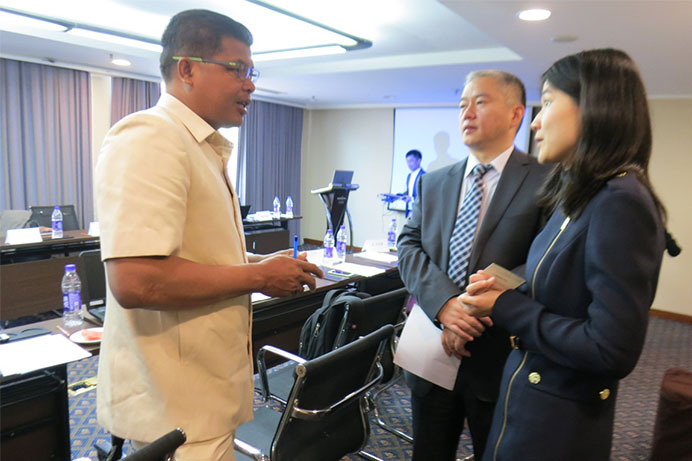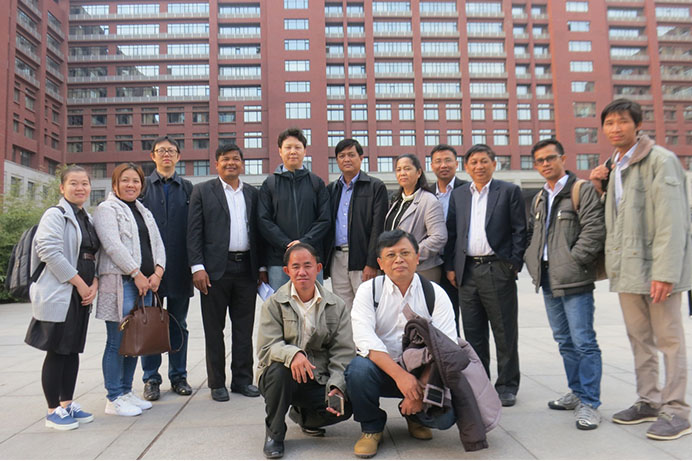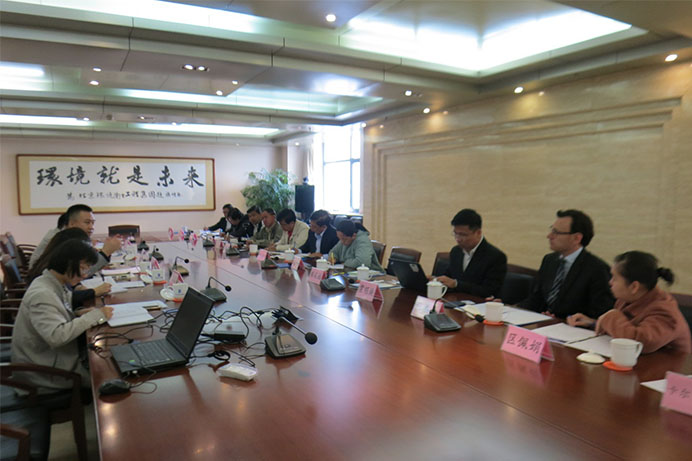
The NGO Forum on Cambodia (NGOF) with American Friends Service Committee (AFSC) to host an Exchange Visit on Social Cooperate Responsibility (CSR) on Land and Water Governance in Beijing, China from 2nd – 8th April 2017. There were 11 delegations including the Ministry of Mining, the Ministry of Environment and the Ministry of Agriculture Forestry and Fisheries and its members from representative of LAHRiN and IPFN and RCC steering committee members took part the exchange visit. The regional exchange program’s main purpose is to strengthen capacity of network members and government officers through learning from experiences of private companies and government departments in China on land issues and Cooperative Social Responsibility (CSR), gain knowledge and experience in CSR’s concepts and strengthen cooperation and relationship between private sectors and civil society organizations.
Sharing and Learning on CSR
CSR’s training session is a part of the exchange program, Dr. Wang Xiaoguang, Director of Beijing Rongzhi Corporate Social Responsibility Institute, shared CSR’s concept in policy development and practices. He has worked related field of CSR over 12 years since a year of the CSR’s policy formulation in China. The original CSR’s concept was initiated in 1923 in United State of America. CSR has been formed due to increasing overseas investment in the world. However, the implementation of CSR has been faced with many challenges because most of companies think only benefits. Currently, CSR is became a popular tool to support for converting any challenges to opportunity and contributing for sustainable development. There are many types of CSR implementation as it would be started from charity to company’s responsibility in a society. CSR is contributed to protect community’s rights. For example, Japanese have started their campaigns to promote CSR since 1948 related to sanitation and food…etc.
According to CSR’s standard 26000 (https://www.iso.org/iso-26000-social-responsibility.html), organizations around the world, and their stakeholders, are becoming increasingly aware of the need for, and benefits of, socially responsible behavior. The objective of social responsibility is to contribute to sustainable development. An organization’s commitment to the welfare of society and the environment has become a central criterion in measuring its overall performance and its ability to continue operating effectively. This, in part, is a reflection of the growing recognition that we need to ensure healthy ecosystems, social equity and good organizational governance. Ultimately, an organization’s activities depend on the health of the world’s ecosystems. These days, organizations are subject to greater scrutiny by their various stakeholders.
Ms. Li Wen, Senior Director of Culture of Kun Lun Energy Co., Ltd, shared about CSR’s policy and practices in China”. Government of China has taken high consideration on CSR’s implementation in 2008. Currently, there are six ministries have worked closely to promote CSR. CSR’s annual meeting has been organized by the government which is required individual company to submit and share their annual report. For example, more than 2,500 company’s reports were submitted annually.
Ms. Bo Lin, Vice Editor of a Media in China, presented on power of Medias related CSR. We have experienced to organize 11 times on CSR which invited company to join. It was a platform to share ideas, concept and their implementation. As a part of promoting CSR, we conducted our campaign to find a golden bee in 2006. A golden bee is an award for a good the company who is the best of CSR’s implementation.
Miss. Ding Shan Shan from a NGO’s representative in China introduced new technology of “Blue Map”. The Blue Map app is designed to be the one-stop shop of environmental data for users who live in China or frequently visit China – and it is now available in English for the first time! First, it provides the public with comprehensive and authoritative information about air and water quality and industrial emissions, and visualizes this data via dynamic maps, to help inform users in making everyday decisions. Second, the app serves as a channel for public participation, facilitating citizens to report pollution and polluters and giving consumers the data they need to implement green consumption. The information collection is increased year to year. For example, we collected small among of numbers in 2004 but the numbers were increased to 71,429 files in 2016.
This application will educate people to understand how they should buy some goods to contribute for CSR. We cooperated with NRDC in US to create a system called “CITI – cooperate information transparency index”. Our mandate is educate people and understand about company who contributed for green environment and bad in environment pollution. Through our works over 10 years, we have recorded that over 800 companies have informed that they are reforming their activities in the whole country.

Cambodia delegation visited Private Companies and Government Departments in China
Dr. Zhao Meng, an Associate Professor at Business School of the Renmin University, introduced CSR’s background and practical implementation in China. CSR has been contributed to increase company’s products and extended more private investments with high responsibility to deal with social challenges. However, we faced with many challenges if we are talking about CSR’s standard. China government tried to enforce law and policy to encourage private sectors to be more responsibility and accountability for their business. The policy is also encouraged citizen’s participation through filling complaint mechanisms and use social media to spread out issues.

On 7th April 2017, a meeting with Beijing Environment company which is leaded role of waste management in Beijing, China. Prof. He Liang, General Manager of Beijing Environment Co., Ltd, introduced that the company has experienced to address the issue of waste management over 68 years. Presently, 35 cities or equal 50% of wastes in China have been managed by the company. There are 25,000 tons of wastes have been collected annually. Through experiences, we have some challenges related to find good solutions of waste management. For example, in United State of America they used an approach of waste management in underground but in Japan they burnt. In China, we use many approaches because half of waste’s water, therefore, 50% use for fertilizers, 40% burnt and 10% underground. Burning waste is part of our grogram to generate renewable energy of gas and electricity. This program is subsidized by state as a policy to promote renewable to 20% by 2020. However, we reached only 5% in 2015.
In addition, Prof. He Liang informed that the company has implemented CSR more than policy’s requirement. For example, we have promoted creditability of waste workers through awareness raising program to increasing people understanding of waste workers’ role to contribute for society. The CSR annual report has been shared publicly. It’s government requirement. If we are not applying well, we would face with losing job or decreasing salary. In addition, media agencies have closely monitored. There are two institutions both government and party evaluate on company CSR.
